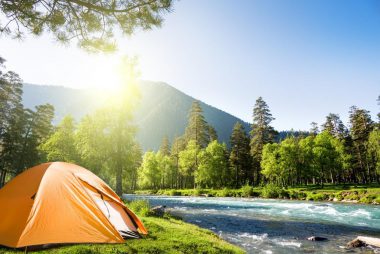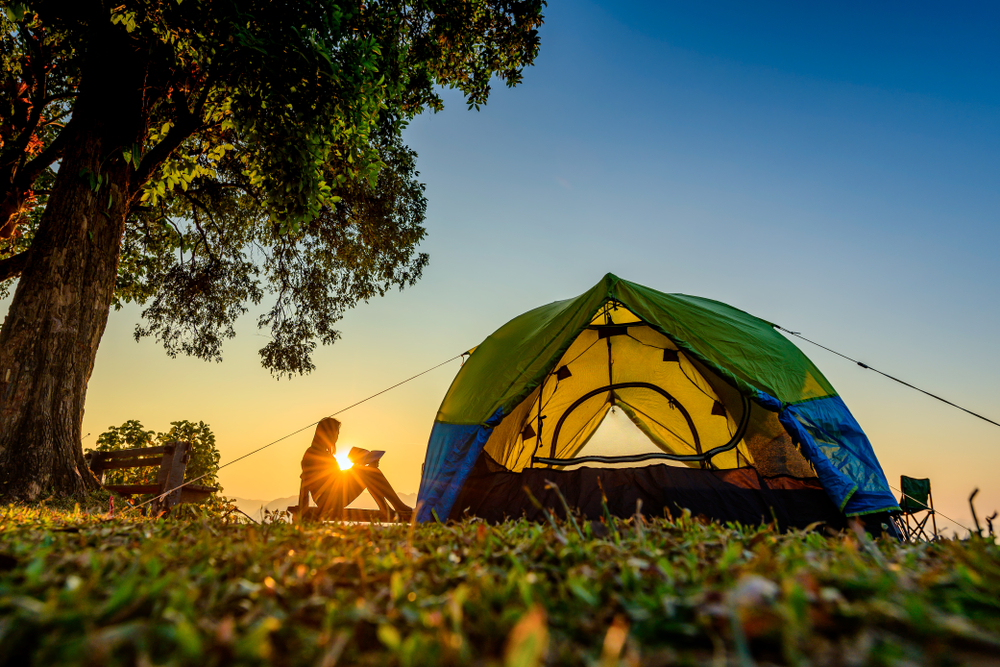Sleeping outside during your holiday not in a hotel or guesthouse is the highest of feelings for some people. And that is understandable, because after all, without a permanent dwelling, you are much closer to nature. There are different variants when it comes to moving the sleeping place to a natural environment. In addition to overnight stays in a caravan or van, camping is a classic that will never go out of fashion. You can read about the advantages of camping with a tent, what exactly is so beautiful and special about it, which tent is best suited for whom and what you should pay attention to when camping with a tent.
These are the advantages of camping with a tent
Camping with a tent has some advantages. You are very flexible with a tent and can sleep wherever you like in countries where wild camping is allowed. This form of overnight stay is therefore particularly suitable for those who like to get very close to nature and prefer to spend their holidays hiking or cycling. This is because lightweight tents and sleeping bags as well as sleeping mats can be easily transported in a backpack or in panniers attached to the bike. If you then pitch the tent in an idyllic spot in the middle of the starry sky, it becomes really romantic. And all adventure lovers are also recommended to camp with a tent.
Admittedly, the sounds of nature can seem a little creepy in the dark. But the sounds that frighten us are usually easy to explain, because they are, for example, the crawling noises of forest and meadow dwellers. Especially if you are traveling with children, this form of vacation can become an adventure that will be remembered by the offspring for a long time. In addition, you can also save money when camping with a tent. Because even if you don’t have the opportunity to look for a place to sleep completely free of charge as a wild camper, but spend the night on tent sites and campsites, this type of vacation is often cheaper than renting in hotels or holiday apartments. For campsites, fees must also be paid in order to be allowed to pitch your tent there, but depending on the region, these are manageable in Germany , for example, at around ten to 25 euros per night and person. Camping is also very healthy, as you spend the whole day, and even at night, in the fresh air. Furthermore, it is easier to take a dog with you when camping, because four-legged friends are not welcome in many overnight accommodations.
Which tent for what?

Depending on how many people you want to spend the night with and where you want to spend the night with the tent, different types of tents are suitable. Another decisive factor for choosing the right tent can also be the weight of the shelter, at least if you don’t transport the tent by car, but in a backpack or by bike. For a camping holiday with the family in a tent, there are family tents that are very spacious and offer enough storage space and an awning. Here, for example, the family can retreat to eat in rainy weather or in the evening. Furthermore, family tents are high so that you can stand comfortably in them.
For couples or individuals, smaller tents are more suitable. When it comes to being able to set up and dismantle the tent as quickly as possible, for example because the location is to be changed more often, pop-up tents are particularly suitable. They are light and flat packed and stand with a skilful throw. Trekking tents come in different forms. They can be designed as a tunnel tent, round and low or even as a higher dome tent. These tents are more robust and often more comfortable than a pop-up tent, but it takes longer to set up and take down and the weight of the tent is also higher. When choosing the right tent, you should think about how exactly you want to use it and weigh up the pros and cons.
What you should consider when camping with a tent
The right equipment is particularly important when camping with a tent. Because the tent is the only outer skin you have. So if it gets cold or wet, a tent often offers less protection than a permanent dwelling. Therefore, the choice of sleeping bag, sleeping mat and outdoor clothing should always correspond to the season and the expected weather conditions. In addition, there should always be enough change of clothes packed in a waterproof bag. This way you can keep dry even in heavy rain.
Furthermore, you should never travel with a tent that is too small. Tent holidaymakers must always keep in mind that not only they, but also all their luggage must have comfortable space in the tent. It is also a good idea to always take a small camping gas stove, a little crockery, coffee, tea and possibly some packet soups with you. Even if you always want to get food in a restaurant when camping in a tent, the gas stove can be worth its weight in gold on rainy days if you want to warm up a little. To save weight and storage space, however, chic clothes can be left at home. In general, clothing should be functional when camping in a tent. It is best to follow the onion look and limit yourself to the bare essentials


